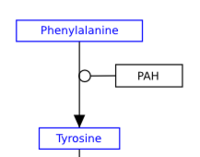Help:Guidelines EditorPalette
From WikiPathways
(Difference between revisions)
(→Line / Arrow) |
|||
| Line 14: | Line 14: | ||
!Activation by cAMP | !Activation by cAMP | ||
|- | |- | ||
| - | |[[Image:Arrow.png | + | |[[Image:Arrow.png|200px]] |
| - | |[[Image:Arrow_binding.png | + | |[[Image:Arrow_binding.png|200px]] |
| - | |[[Image:Arrow_translocation.png | + | |[[Image:Arrow_translocation.png|300px]] |
| - | |[[Image:Arrow_activation.png | + | |[[Image:Arrow_activation.png|200px]] |
|} | |} | ||
| Line 23: | Line 23: | ||
The dashed line and arrow are used to denote an uncertain process or a process that involves additional steps not outlined in the current diagram. | The dashed line and arrow are used to denote an uncertain process or a process that involves additional steps not outlined in the current diagram. | ||
| - | [[Image: | + | {|class="prettytable" |
| - | + | |- | |
| + | !Multi-step process without details | ||
| + | |- | ||
| + | |[[Image:Dashed_MultiStep.png|200px]] | ||
| + | |} | ||
==== T-bar ==== | ==== T-bar ==== | ||
Revision as of 00:07, 26 March 2014
This guide describes the most common uses of various elements of the WikiPathways editor palette. Examples are taken directly from the WikiPathways archives. If you have questions about specific cases, contact the discussion mailing list.
Interactions
Basic set
Line / Arrow
The solid line and arrow are used to denote a variety of processes, including conversion, translocation, activation, binding and modification.
| Enzymatic conversion | Receptor binding | Translocation between compartments | Activation by cAMP |
|---|---|---|---|
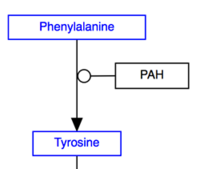
| 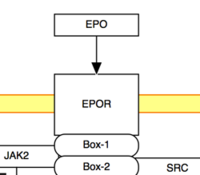
| 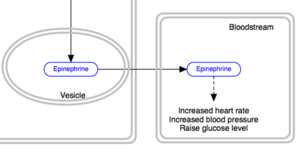
| 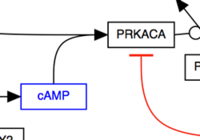
|
Dashed line / dashed arrow
The dashed line and arrow are used to denote an uncertain process or a process that involves additional steps not outlined in the current diagram.
| Multi-step process without details |
|---|

|
T-bar
The T-bar is used to denote inhibition.
MIM set
The WikiPathways editor includes a set of MIM interaction types, based on the Molecular Interaction Maps notation.
Necessary stimulation
Catalysis


